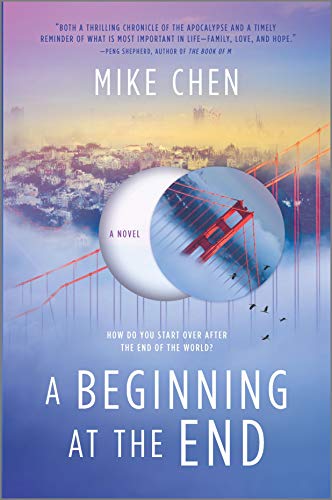A Beginning at the End

“A Beginning at the End is a heartfelt family drama . . .”
Although billed as an apocalyptic novel, Mike Chen’s latest release, A Beginning at the End, is actually at its core a family drama, a heart-warming tale of second chances after a child’s love transforms the adults around her.
The setting is the near future, six years after a global pandemic has killed two-thirds of the world’s population. During the years of the pandemic fear ruled; people were either confined in large-scale quarantine areas or roamed the land fighting for survival. Governments fell, technology failed, and faith in every institution and religion was lost.
And none of this really matters. Although Chen peppers his novel with references to this near-apocalypse—including a meandering tale of an event, the Greenwood Incident, which somehow reshaped the entire society—there is really nothing these characters face that couldn’t happen today.
The novel centers around three adults, all who have acted impulsively, building their lives on lies, and who now have regrets. Plus, a precocious seven-year-old girl, Sunny, who is more mature and adult than any of them.
Sunny’s father, Rob, is in trouble with the near-future’s equivalent of Child Welfare. For five years, he’s lied to Sunny, telling her that her mother is alive, but seriously ill in a hospital, when the reality is that her mother died during the quarantine. Sunny pushes herself to always be the best in the hopes that her mother will finally communicate with her (email and cell service have survived) and is worried that the reason her mother only talks to her father is that Sunny is somehow a bad girl. Rob is oblivious to the suffering his lies have caused his daughter, telling himself that the truth would be more painful to her and blaming his mistakes—as it seems every adult in this society does—on PASD or Post-Apocalyptic Survivor Disorder.
PASD is so ubiquitous that people attend daily support groups, not unlike AA, and teachers are always searching for signs of it in their students as evidence that parents are not providing adequate support to this precious new generation of survivors. In fact, the two forces forging this post-pandemic society seem to be avoiding the next pandemic and avoiding facing the fact that everyone left alive is naturally grieving—not suffering from a new disorder that the government can fix.
When Sunny acts out in school, revealing her father’s deception to her teacher, he’s forced to prove that he is able to provide her a psychologically sound home. He does this by taking the easy way out and lying again—while still hiding the truth about her mother’s death. He enlists the help of an extrovert event planner who in turn pairs Rob with one of her clients in the hopes of fooling the powers-that-be that into thinking he has a stable relationship.
Both women have secrets of their own, also stemming from the pandemic years, but none are serious enough to provide much suspense—in fact, at several points in the novel a simple, honest conversation from any of the adults would have solved most of their problems and avoided pain. Despite their borderline narcissism, the characters are engaging—mainly because vivacious Sunny loves them, so the reader cares about them as well.
Perhaps the most frustrating part of A Beginning at the End are the snippets of future academic reports, news stories, and repeated accounts of the mysterious Greenwood Incident. They are dry and unilluminating, adding nothing to the family drama of the main plot and seem thrown in only to somehow give this novel credibility as science fiction. In fact, the Greenwood Incident turns out to be so undramatic and irrelevant that it distracts from Rob and Sunny’s story because the reader keeps turning pages to find out the truth behind the Incident, only to be disappointed by its banality.
A Beginning at the End is a heartfelt family drama, but readers expecting the next Station Eleven might be disappointed by its lack of world-building.